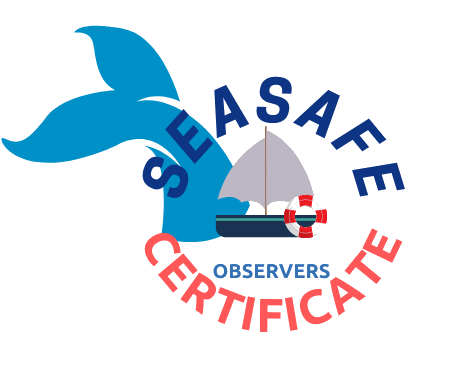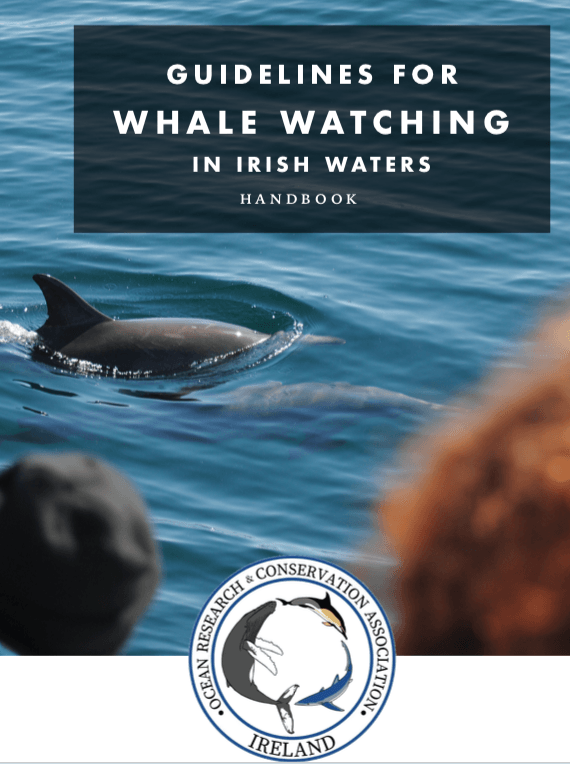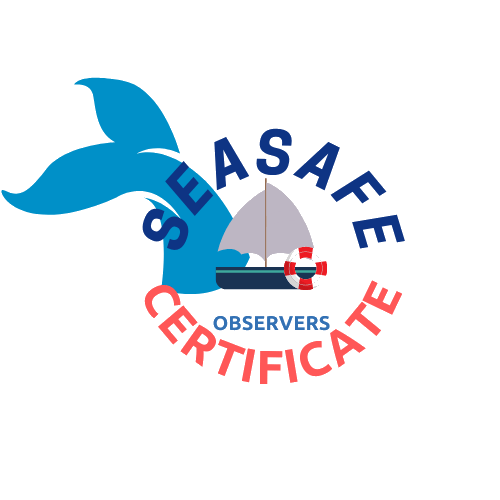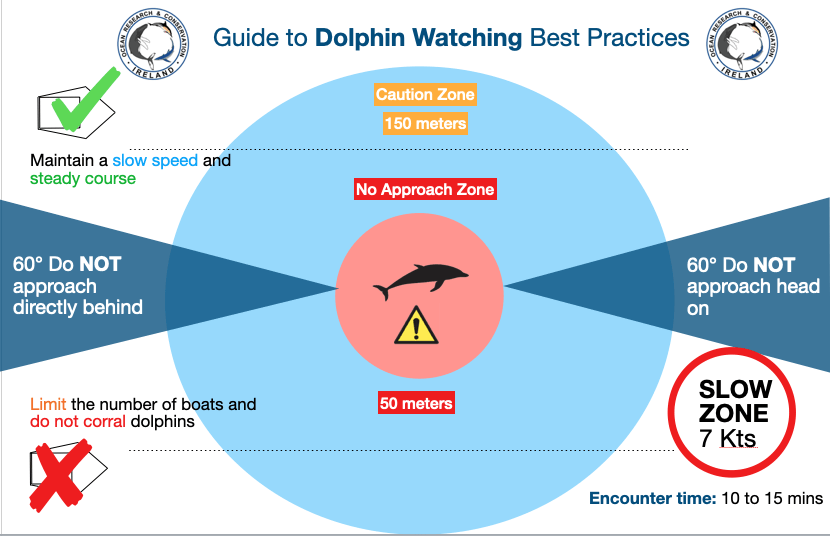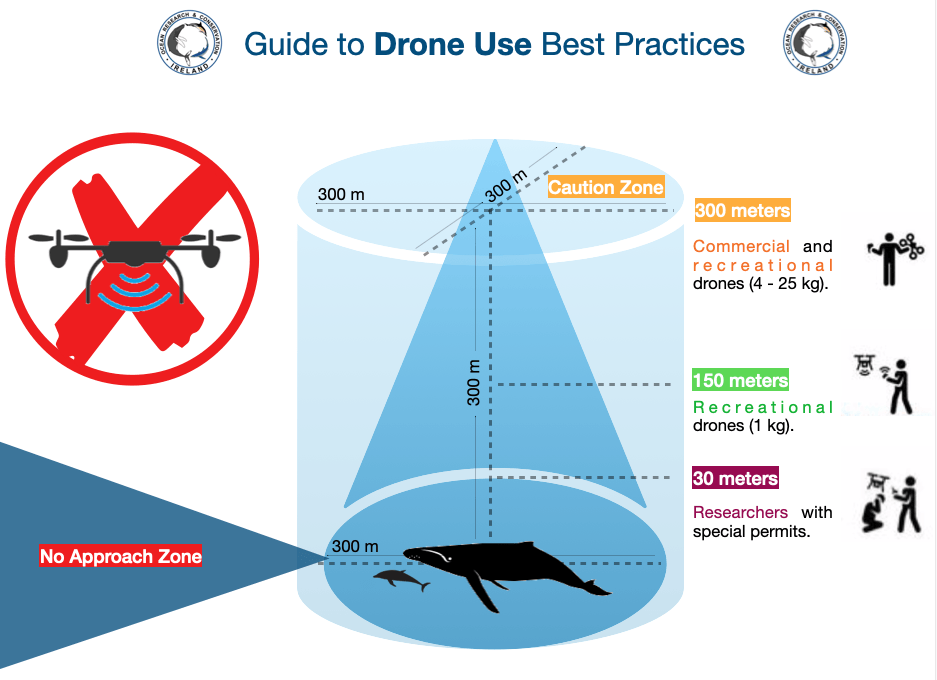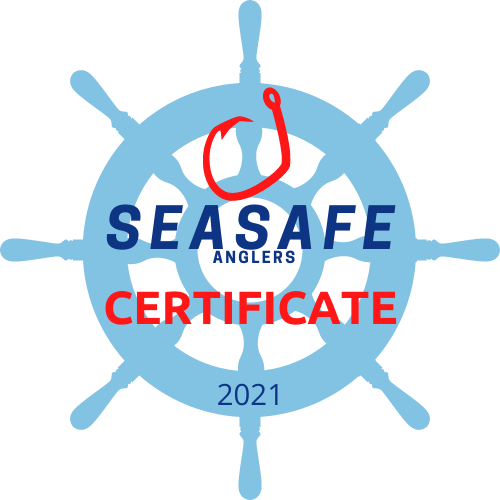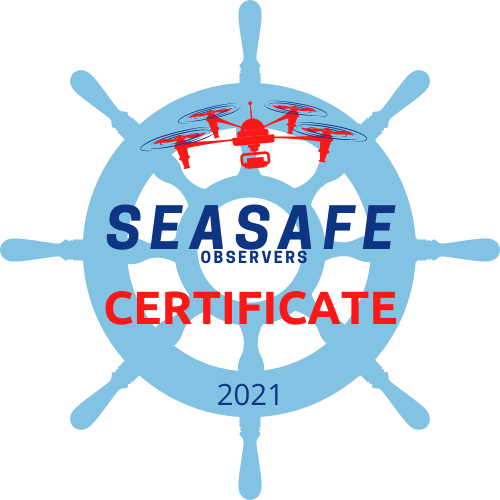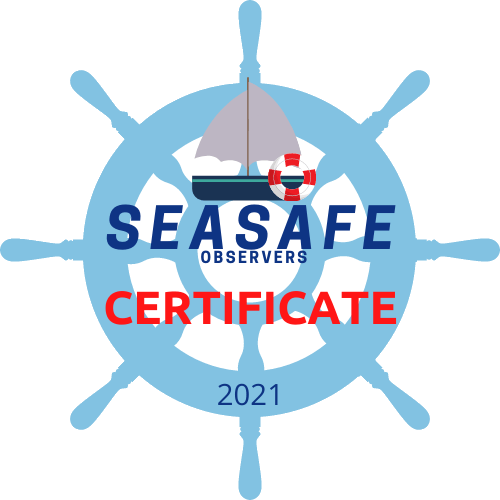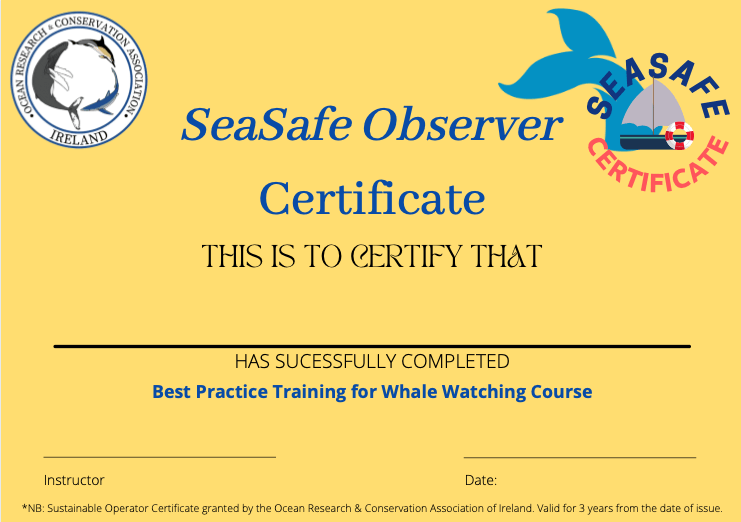ORCA Ireland's "SeaSafe Observer® Certificate" is available to eco-tour operators, recreational boat users, watercraft users, photographers and anyone who signs up to our SeaSafe Observer® Training Course and receives a free copy of ORCA Ireland's best practices and "Codes of Conduct for Whale & Wildlife Watching ", which includes measures operators should take to minimise disturbance to cetaceans and other marine megafauna in Irish waters for whale watching and drone operations.
Note: Operators will only be qualified having received a SeaSafe Observers Certificate, Digital Badge for their website and Boat flag, following training and a formal assessment process as outlined in the above handbook. Certified Operators will be listed on our website as recommended eco-tour operators.
SEASAFE OBSERVER PROGRAMME
IRELAND’S NATIONAL TRAINING PROGRAM FOR MINIMISING DISTURBANCE TO MARINE WILDLIFE.
SEASAFE OBSERVER CERTIFICATE
Ireland's first National Training Course to promote SEASAFE Observers "Best Practices" and Codes of Conduct for whale watch operators, drone observers and recreational anglers to ensure Ireland meets international standards on marine animal welfare.
Join a growing community of conservation minded ocean lovers!
Become a SEASAFE Operator and ensure the highest standards of responsible whale and wildlife watching for your passengers.
Ireland’s National Training Program for Minimising Disturbance to Marine Wildlife.
Unsustainable or poorly managed whale and dolphin watching activities have been shown to negatively impact cetaceans, compromising welfare which may lead to population declines and likely have implications for the health of associated marine ecosystems. By contrast, well managed ecotourism activities strive to prioritise the welfare and conservation of the species they encounter.
In the Atlantic islands area, approx. 1.7 million people a year go whale watching, with a total expenditure of 119 million. In this region, there are approximately 90 existing Marine Protected Areas (MPAs) where cetaceans are present and the 59 MPAs represent nearly 27 percent of all MPA's worldwide. When whale watching is carried out in a sustainable manner, especially in or near a cetacean MPA, with regulations in place, it has the potential to take a leading role in the development of an island-based eco-tourism industry.
The SEASAFE Program was designed to create awareness of wildlife and to promote responsible and safe encounters for both human and animal welfare, meeting the highest national standards.
Our aim is to promote responsible wildlife watching and encounters through training operators in recreational, commercial and industrial maritime activities, through accreditation and raising awareness.
We also aim to educate the general public and tourists in coastal towns and villages.
If you are looking for an SEASAFE Operator for your next boat trip, find one that displays these badges below:
SESAFE WHALE WATCHING
Perfect for sustainable and animal welfare conscious ecotour operators
sailing clubs, kayak clubs and photographers.
€ 150.00 per person
SEASAFE ANGLER
Perfect for the crew of small eco-tour angling charter boats. Also ideal for other commercial companies in coastal habitats such commercial fisherman.
€ 150.00 per person
SEASAFE DRONE OBSERVER
Perfect for eco-tour operators, researchers and film-makers wishing to capture footage of marine wildlife with UAV's or drones.
€ 220.00 per person
The SeaSafe Observer Training Programme is open for any eco-tour operator or person with a recreational boat, kayak or drone that would like to apply. It is carried out over a 2 day period, and may involve a mix of online learning and an on-site visit during one of the eco-tours. Sign up today and we will contact you with dates of our next available course.
Certified Courses
Certification from the SEASAFE Observers program will provide your business with credibility and reassurance to your customers. On completion individuals and companies can be listed under our SEASAFE Operators. Operators are also provided with the SEASAFE boat-sticker, flag and logo for promotional use along with copies of all Codes of Conduct.
Avoid Accidents
Learning "Best Practices" detailed in our Codes of Conduct will teach operators the optimal methods for encountering wildlife at sea, ensuring the welfare of animals, humans and property involved. Injury to people, animals and damage to boats are common when appropriate actions are not taken to minimise disturbance to marine wildlife.
SEASAFE Observer
Becoming SEASAFE operator will help you to understand the need for marine wildlife conservation. Our courses provide interesting scientific facts about marine species frequently encountered, how to look for them and how to identify species. We also examine and the effects of disturbance from human activities in the marine environment. This will expand your knowledge and make your time at sea more enjoyable!
Interested in our services? We’re here to help!
The SeaSafe Observer Certificate ensures a high standard of sustainability is up-held when it comes to adhering to ORCA Ireland's "Guidelines for Whale Watching Handbook", encouraging the implementation of best practices and increased knowledge on marine species biodiversity and ecology. Operators involved in initiatives of environmental responsibility are regularly highlighted across our social media platforms and on our website.

